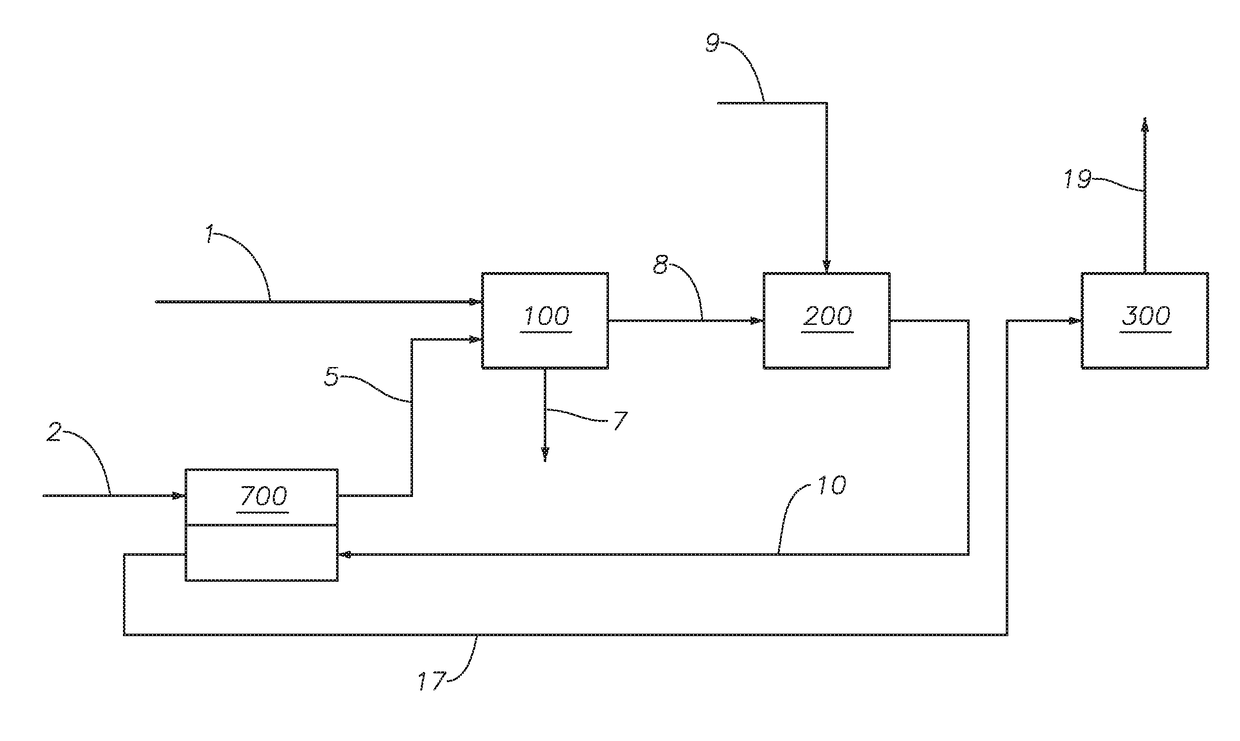Enhancement of Claus tail gas treatment by sulfur dioxide-selective membrane technology
a technology of membrane technology and claus tail gas, which is applied in the direction of sulfur preparation/purification, separation processes, energy input, etc., can solve the problems of significant capital cost of the claus treatment unit, catalyst bed plugging or deactivation, reaction furnaces can destroy contaminants such as hydrocarbons, and achieve the effect of minimizing sulfur dioxide emissions and improving sulfur recovery from the claus uni
- Summary
- Abstract
- Description
- Claims
- Application Information
AI Technical Summary
Benefits of technology
Problems solved by technology
Method used
Image
Examples
example 1
[0068]Example 1 was simulated based on the configuration embodied in FIG. 2 and described above. Membrane sweeping unit 700 was modeled as a Pebax® 1657 type membrane with the properties as shown in Table 1 and a membrane area of 12522 m2. Acid gas feed 1 was modeled with the composition of feed stream B in Table 2. The resulting concentrations of components % vol for selected streams are shown in Table 3.
[0069]
TABLE 3Stream Conditions and Flowrates for Example 1.Stream 1Stream 2Stream 3Stream 5Stream 7Stream 8Stream 10Stream 16Stream 17Stream 18PhaseVaporVaporVaporVaporLiquidVaporVaporVaporVaporVaporTemp (° C.)41.8252525.0126.8213.0482.22525.025.0Pressure28.11729.4029.429.423.7623.76628.928.928.928.9(psia)Flow Rate3581.76664.36495.76562.82736.48786.69135.66206.06139.06139.0(Kg-mol / hr)H2S0.7700.0000.0000.0000.0000.0040.0000.0000.0000.000CO20.1900.0000.0000.0050.0000.0810.0780.1150.1110.111H2O0.0400.0130.0130.0130.0000.3360.3280.0100.0100.010O20.0000.2070.2070.2050.0000.0000.0020.003...
example 2
[0072]Example 2 was simulated based on the configuration embodied in FIG. 3 and described above. Membrane sweeping unit 700 was modeled as a Pebax® 1657 type membrane with the properties as shown in Table 1 and a membrane area of 11126 m2. Acid gas feed 1 was modeled with the composition of feed stream C in Table 2. The resulting concentrations of components % vol for selected streams are shown in Table 5.
[0073]
TABLE 5Stream Conditions and Flowrates for Example 2.Stream 1Stream 2Stream 3Stream 5Stream 7Stream 8Stream 10Stream 16Stream 17Stream 18PhaseVaporVaporVaporVaporLiquidVaporVaporVaporVaporVaporTemp (° C.)41.8252525.0127197.6482.2252525Pressure28.1129.429.429.423.7623.7628.928.928.928.9(psia)Flow Rate3581.73334.33269.13384.11364.36286.36477.74966.74851.64851.6(Kg-mol / hr)H2S0.3850.0000.0000.0000.0000.0030.0000.0000.0000.000CO20.5770.0000.0000.0300.0000.3450.3350.4370.4260.426H2O0.0380.0130.0130.0130.0000.2450.2410.0100.0100.010O20.0000.2070.2070.2000.0000.0000.0020.0030.0030.00...
example 3
[0076]Example 3 was simulated based on the configuration embodied in FIG. 2 and described above. Membrane sweeping unit 700 was modeled as a Pebax® 1657 type membrane with the properties as shown in Table 1 and a membrane area of 2855 m2. Acid gas feed 1 was modeled with the composition of feed stream E in Table 2. The Tail Gas Treatment unit (part of Claus Process 100) reaches 99.24% recovery. The resulting concentrations of components % vol for selected streams are shown in Table 7.
[0077]
TABLE 7Stream Conditions and Flowrates for Example 3.Stream 1Stream 2Stream 3Stream 5Stream 7Stream 8Stream 10Stream 16Stream 17Stream 18PhaseVaporVaporVaporVaporLiquidVaporVaporVaporVaporVaporTemp (° C.)41.8252525.0127200482.2252525Pressure28.1129.429.429.422.6722.6728.928.928.928.9(psia)Flow Rate2680.82798.02777.82806.61152.34912.24999.53740.53711.93711.9(Kg-mol / hr)H2S0.4310.0000.0000.0000.0000.0010.0000.0000.0000.000CO20.5300.0000.0000.0090.0000.2950.2900.3870.3830.383H2O0.0380.0130.0130.0130.0...
PUM
| Property | Measurement | Unit |
|---|---|---|
| temperature | aaaaa | aaaaa |
| pressure | aaaaa | aaaaa |
| temperature | aaaaa | aaaaa |
Abstract
Description
Claims
Application Information
 Login to View More
Login to View More - R&D
- Intellectual Property
- Life Sciences
- Materials
- Tech Scout
- Unparalleled Data Quality
- Higher Quality Content
- 60% Fewer Hallucinations
Browse by: Latest US Patents, China's latest patents, Technical Efficacy Thesaurus, Application Domain, Technology Topic, Popular Technical Reports.
© 2025 PatSnap. All rights reserved.Legal|Privacy policy|Modern Slavery Act Transparency Statement|Sitemap|About US| Contact US: help@patsnap.com



